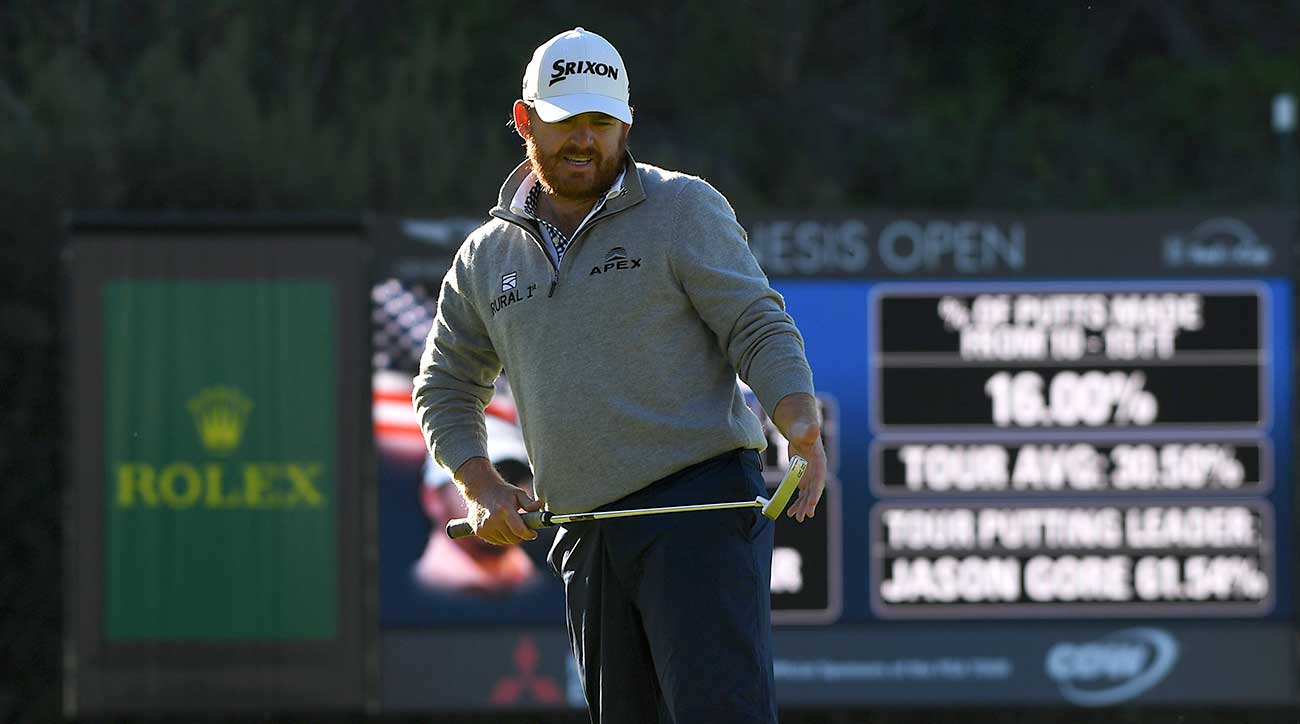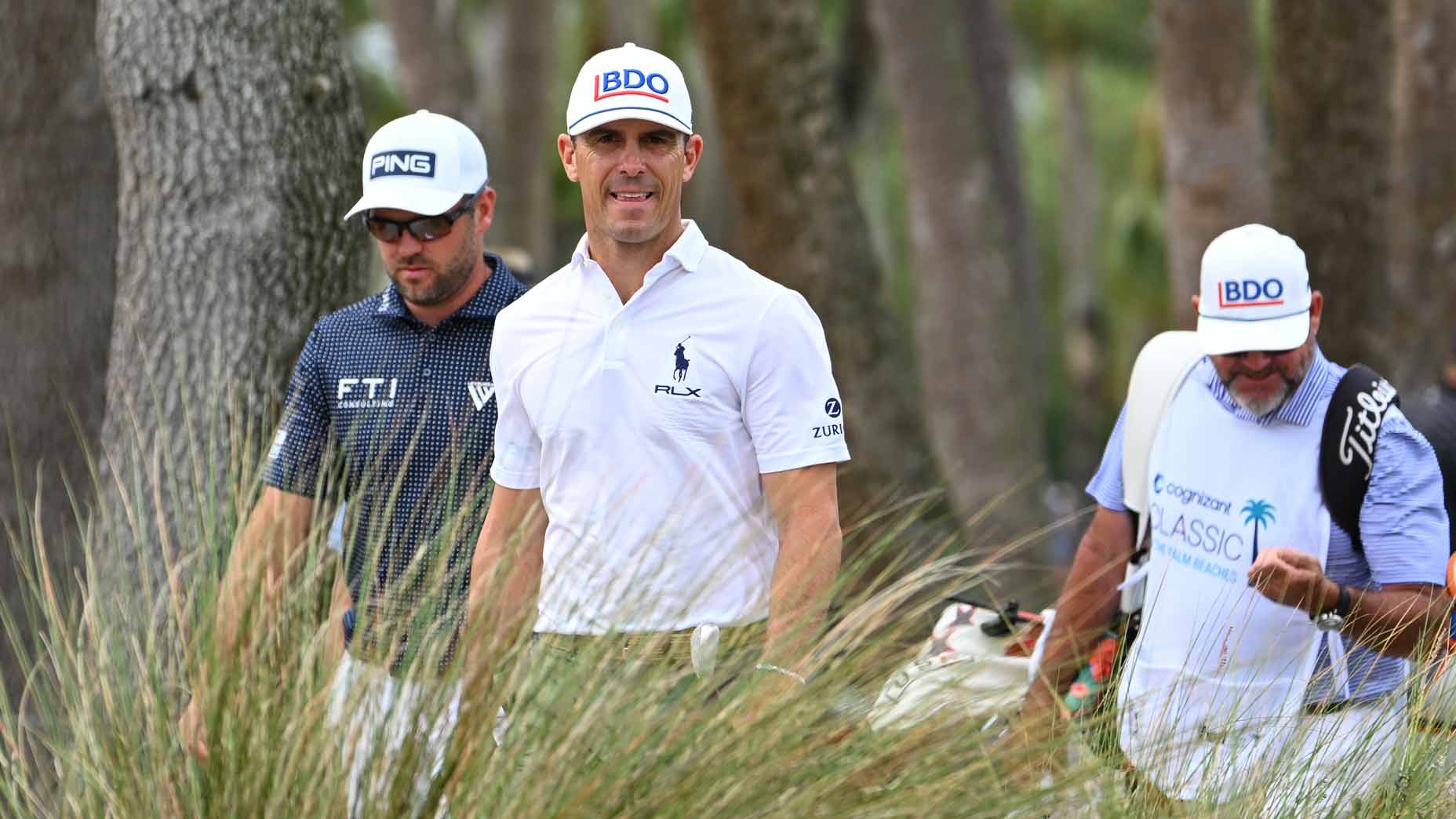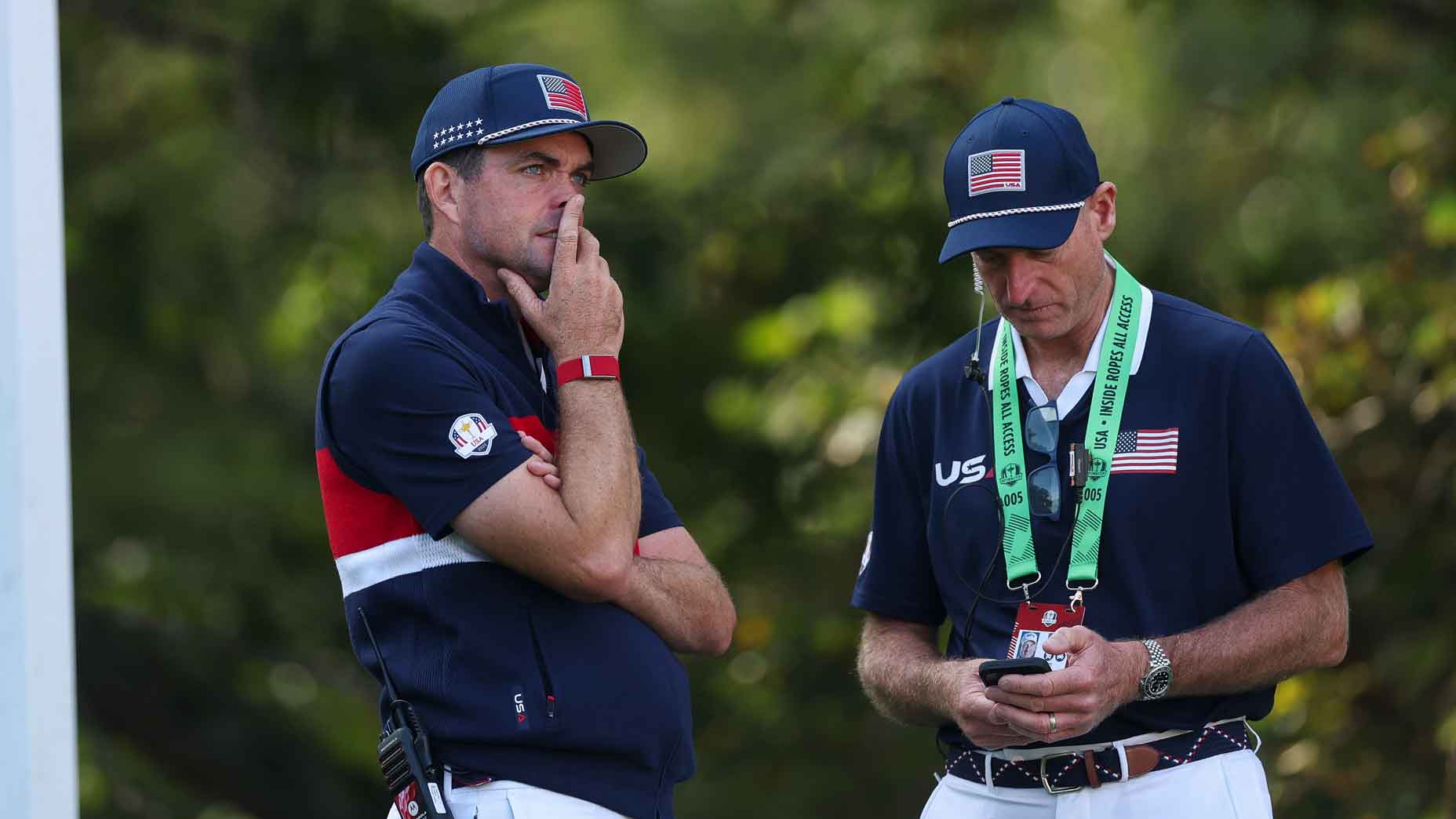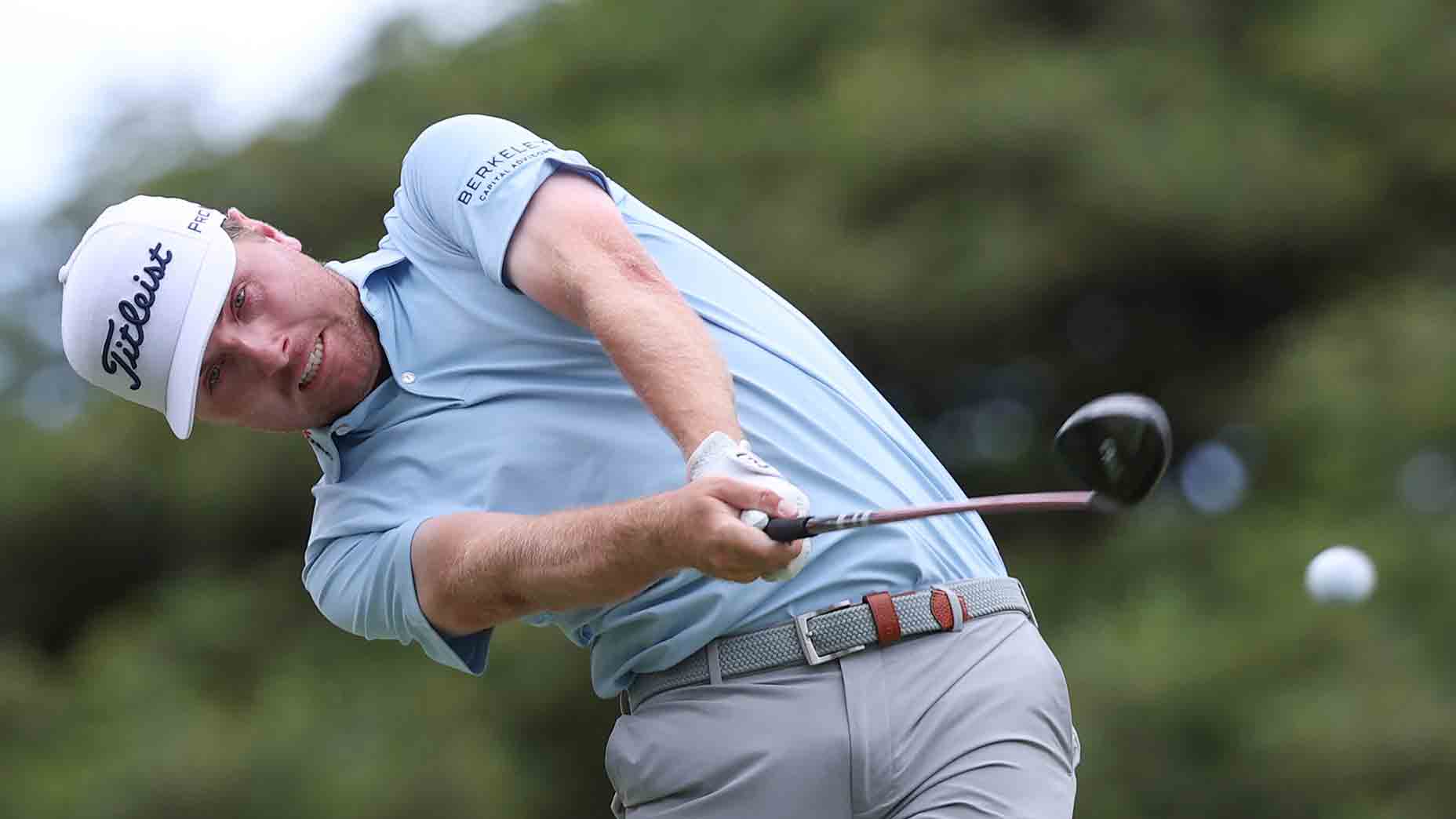Check in every Sunday night for the unfiltered opinions of our writers and editors as they discuss the hottest topics in the sport, and join the conversation by tweeting us @golf_com. This week we discuss Matt Kuchar’s fill-in caddie controversy, the response to it and what the fallout might be, Lucy Li’s amateur eligibility, Phil Mickelson potentially skipping the Players Championship and more.
1. GOLF.com’s Michael Bamberger reported that after Matt Kuchar paid his fill-in caddie at the Mayakoba $5,000 for a victory in November, his looper, David “El Tucan” Ortiz, reached out to Kuchar’s agent, Mark Steinberg, for an additional $50k; Steinberg countered with $15,000, which Ortiz declined. Kuchar addressed the situation at the Genesis Open, saying that, “For a guy who makes $200 a day, a $5,000 week is a really big week.” A day later — and after intense blowback on social media and beyond — Kuchar released a lengthy statement, apologizing for his “out of touch and insensitive” remarks. He also said Ortiz would receive the full total requested. The ever-smiling Kuchar has long been a fan favorite; how much will this fiasco damage his image and reputation? And would you expect it to have an impact on his sponsorship opportunities moving forward?
Dylan Dethier, associate editor (@Dylan_Dethier): The catcalls at Riviera this weekend confirmed what we already knew: this is, and will remain, a real thing. We move on fast (Remember what people were saying about Sergio Garcia last week? Or Phil Mickelson at last year’s U.S. Open?) but this will stick as a part of Kuchar’s reputation. No specific word on the Skechers relationship, though.
Alan Shipnuck, senior writer (@Alan_Shipnuck): First of all, let’s praise the golf world’s Robin Hood, our own Michael Bamberger, who cracked this thing wide open. Kuchar certainly destroyed a lot of goodwill but the American sports fan has a very short memory – to cite one easy example, Tiger Woods has done a helluva lot worse and he is more beloved than ever. Kuchar will survive this but it was and remains a very bad look.
Michael Bamberger, senior writer: Thank you, Alan. Tom Gillis really opened this thing up. Makes a fella believe in the power of citizen reporting.
Jeff Ritter, digital development editor (@Jeff_Ritter): It’ll leave a mark because his first opportunity to make things right was so woefully tone deaf and out of touch. Like Shipnuck mentions, people forgive and forget, but no matter what happens from here, Kooch will never be mentioned with Jack, Arnie, Phil and others who are known for their generosity along with their great playing careers. Instead, Kuchar’s name is stamped on the cheapskates list. Not a great place to be.
Josh Sens, contributor (@JoshSens): I spent much of Friday, prior to Kuchar’s apology, talking to agents and sports marketing people about this very subject. They all said they expected he would not lose a single sponsor and that it would have zero negative effect on his future on-course earnings. If anything, they said, a well-crafted apology, coupled by making some amends (as Kuchar has promised to do), might actually be a boost to his image long term. I suspect they’re right. That’s how our cycle of sin, scolding and redemption tends to play out in the marketplace. For those who might be curious, a veteran agent told me a player of Kuchar’s status stands to earn anywhere in the neighborhood of $10-$15 million a year off the course. In the caddie yard and in the bag drop area, this story will stick. But no real financial impact. In the end, the public’s attention span isn’t that long. The days go by and one headline nudges another one off the front page. The El Tucan story was bad news for Kuchar but goods news for Sergio Garcia, whose own gopher-on-the-green embarrassments were pushed below the fold.
Bamberger: We know something about Kuchar we might not have known before: he has the “frugal” gene. In his mind he really did nothing wrong. He couldn’t see it as most people could.
2. According to emails shared by Ortiz, Steinberg, who also reps Tiger Woods, could have put an end to this situation by paying El Tucan when he first asked for an additional fee. But he felt that an extra $15,000 was sufficient. How much, if any, culpability should Kuchar’s management team shoulder in how this situation played out?
Dethier: Since they’re supposed to be the failsafe for situations exactly like this one, and since Kuchar ended up paying MORE money than they’d initially even been offered, I would say their shoulders should weigh rather heavy after this mess.
Shipnuck: Almost all of it. Successful athletes live in a weird bubble and can be counted on to usually do the wrong thing when confronted with real-world stuff. The whole reason a guy like Steinberg exists is to navigate this kind of complicated situation. He failed utterly and miserably.
Bamberger: Agree. Sean Foley likes to say, as others have, that class or whatever word you want to use is what you do for people who cannot do anything for you, not for those who can. His dismissive response to Ortiz’s emails show that he was lockstep with Kuchar, and tone-deaf. Blind to the man’s plight, and rude.
Ritter: Oh, Kuchar’s team let him down big time on this. The controversy simmered for months before Bamberger blew it open this week. Cutting the full check much earlier would’ve saved Kuchar from himself. And a little media coaching wouldn’t have hurt before Kuchar submitted his absolutely embarrassing “$5,000 is a good week for him,” interview last week.
Sens: Steinberg showed the human touch of a cyborg on this one but Kuchar definitely deserves some blame. A bubble? Sure. But come on. People in bubbles can still do math. Along with a shoutout to Bamberger, kudos should go to whomever wrote the belated apology. That was deftly crafted. One of the subtle things about it was that Kuchar didn’t actually apologize for being a cheapskate. He apologized for his reaction to being called out as a cheapskate. He then wrapped himself in golf’s cliche and exaggerated sense of exceptionalism (this is a game where people call penalties on themselves) but did so in fresh language so it didn’t come off pat. And then the closing promise to make El Tucan whole and contribute long term to the tourney, showing Kuchar to be the good guy so many people have always said he is. It was a textbook demonstration of how to apologize, in the wake of a textbook illustration by Kuchar and Steinberg on how NOT to handle a PR problem. That ghostwriter deserves a generous tip.
Bamberger: He should have said nothing. He should have just sent the check and said nothing. If Ortiz wanted to say something it would have been so much more powerful.
Sens: That’s an interesting take. I get the sentiment but I disagree. This had gotten way beyond money alone. It was important for Kuchar to express the thinking behind his change of heart.
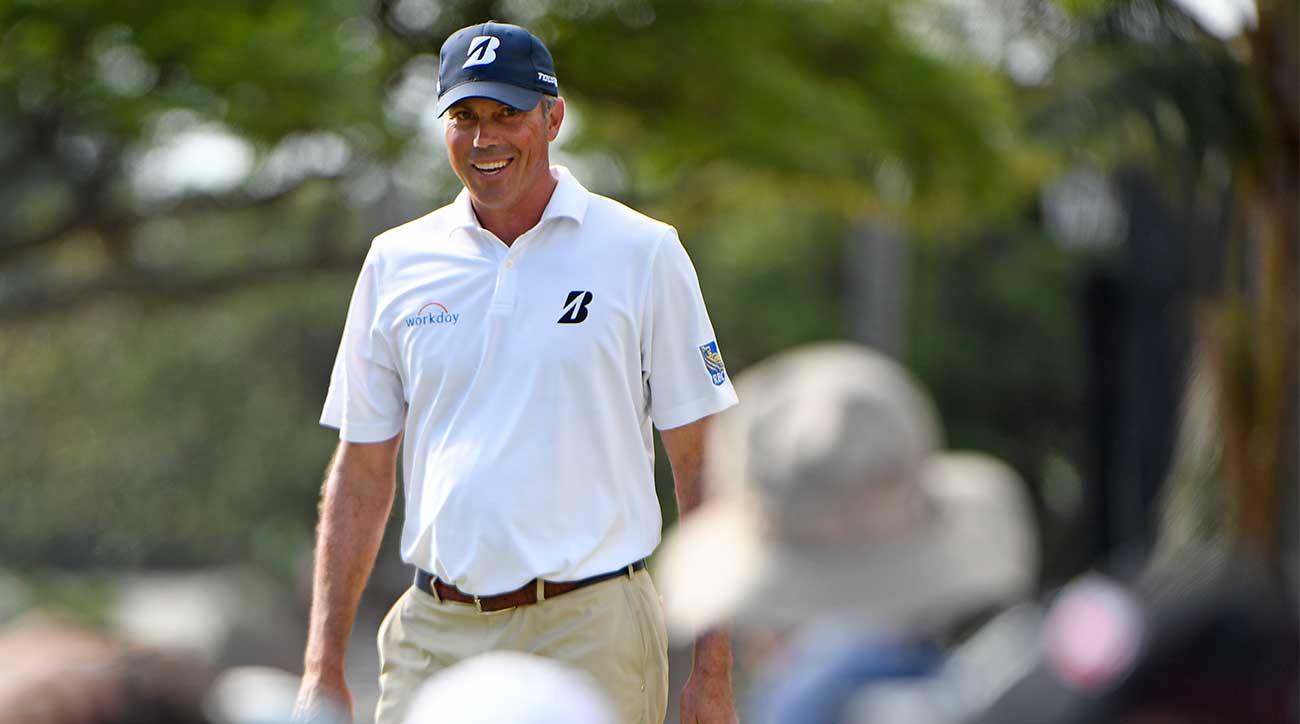
3. Lucy Li, 16, will not lose her amateur status for appearing in an Apple ad in January and will instead receive a one-time warning, the USGA announced Thursday. “Ms. Li has neither received, nor will receive in the future, any monetary or non-monetary (e.g., products) compensation for her appearance in the advertisement,” the statement read. Did Li deserve more than a gentle tap on the wrist?
Dethier: I can’t summon the energy to shout from the rooftops that Li should be punished further — but there’s no doubt the rules surrounding “amateurism” have gotten very weird. Look no further than last week, when famous Tour pro-turned-am-turned pro Gary Nicklaus made his Champions tour debut.
Shipnuck: I feel the same fatigue. Given all of golf’s ills, this isn’t a big deal. Though the Nicklaus thing bugs me. Amateur status should be like your virginity – once it’s gone, it’s gone forever.
Bamberger: Yep — it’s a quaint little controversy. Back in the day, it would have been like Arnold taking Tiger out for lunch when he was at Stanford.
Sens: Well said above. Amateur golf has entered some of that vague and awkward territory that it used to feel immune from. Makes it seem more like so many other sports. As for Li, I’m OK with the wrist-slap. The blame falls more squarely on the adults around her who should have known better.
Ritter: Right. As the pilots of their kids’ early careers, parents need to understand the rules of amateurism. That said, I’m fine with the punishment here.
4. Adam Scott told the New York Times that golf is “becoming the laughingstock” with all of its recent rules changes. “They’ve just written more gray areas into the game that were not necessary,” he said. A fair or overly critical assessment of the new rules book?
Shipnuck: Pretty spot on, actually. But hasn’t golf always kinda been a laughingstock when it comes to the rules?
Dethier: His best rules comments were about slow play, when he called on the Tour to penalize him, if that’s what needed to happen. They proved prescient Sunday, when Scott joined deliberate Justin Thomas and human yawn-machine J.B. Holmes for like, 14 hours of Sunday golf, with nary a mention of “the clock” around. Why have the rule if you’re never even going to consider enforcing it?
Sens: I’m with Dylan here. The new rules haven’t added any complications. They have, on the whole, simplified a byzantine text. But the slow play thing needs to be enforced. It’s awful. Put a shot clock on them and enforce it. Make playing with reasonable dispatch one of the skills you need to compete.
Ritter: I agree that the rules have successfully reduced more gray areas than they added (caddie-lining-up-a-player notwithstanding), and everything said about slow play here is spot on. The real laughingstock in the new rules continues to be the sight of golfers of all shapes and sizes taking these awkward knee-high penalty drops. Bring back the shoulder-height drop!
Bamberger: I can’t believe that ball-searches will go only three minutes. But Scott’s language was the most telling thing. The USGA and the R&A should command our respect. The game actually could devolve without it. And Scott is maybe the most gentlemanly, well-mannered person in the game today.
5. Could Phil Mickelson skip the Players? “It’s not a must-play for me because I’m 48 and I’ve played it 25 times and I’ve already won it,” he told Golf Channel. “If I were young and early in my career, I would say yes because I think it’s as close to a major as it can get. But it’s not the best course for me.” What sort of impact would Mickelson staying home have on the reputation of an event that has long positioned itself as the “fifth major”?
Shipnuck: None, because I’ve devoted my life to debunking the Fifth Major nonsense and hardly need Phil to buttress the crusade. But I do appreciate his support.
Dethier: I’m a newer recruit to Shippy’s cause but have thrown myself wholly behind it. There are FOUR MAJORS. FOUR. Stop this nonsense.
Bamberger: Completely agree. It’s an important interesting event. March will be better for it. It is not remotely the “fifth” major and there are four majors and in a four-bedroom house nobody is bunking up here, as SI once tried to get me to do with John Garrity, in an Augusta rental. I found my own digs. Augusta is a major. The two Opens, Hagen’s PGA— majors. You gonna talk about TPC Sawgrass with THAT CROWD. See Dylan, above.
Ritter: The Players is a fun event but the fifth major thing has always been overblown. If Phil skips it, it’ll be a big story all the way until Thursday morning of tournament week, but in the end, the story will always be about the competition. Hey, that’s one thing the Players has in common with the actual majors.



